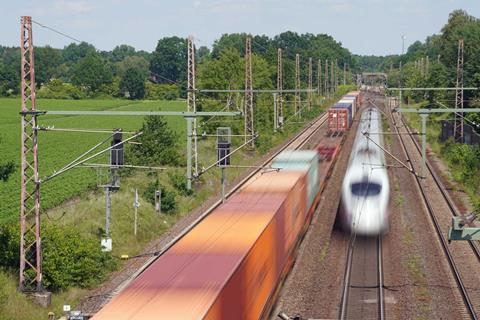[ad_1]

GERMANY: Deutsche Bahn’s supervisory board has endorsed the decision to merge DB Netz AG and DB Station & Service AG into a single infrastructure management business to be known as DB InfraGO AG with effect from January 1 2024.
The decision was taken at the board’s regular meeting on September 27 following government confirmation on September 20 to the CDU-CSU parliamentary group that the merger will go ahead.
The merged company has now been entered into the German Companies’ Register as part of the DB Group.
InfraGO’s brief will be to operate the railway infrastructure as a commercial enterprise with consideration of public welfare goals and the common good, the GO in InfraGO standing for gemeinwohlorientiert, (orientated towards the common good).
DB says that the basis of the new company will be ‘railway infrastructure that is needs-based, powerful and efficient with high capacity, quality and resilience’. This will apply to ‘operations as well as to expansion and maintenance of the infrastructure’. Further, management of the infrastructure ‘should be efficient, network-related and user-orientated’.
InfraGO will ‘meet the legal requirements for transparency and participation’, DB says, and will ensure equal treatment for users in terms of access and fees. Goals set for the company will include promotion of international traffic as well as climate protection, especially through modal shift in freight and passenger transport.
These are to be achieved with the help of a ‘comprehensive modernisation programme for the rail network and for stations’, says DB, adding that ‘federal government has already made important decisions on finance and has made available additional funding of about €40bn’.
In this context the German cabinet launched a reform in June of the Bundesschienenwegeausbaugesetz or Federal Railway Expansion Act which is intended to increase the scope for use of financial resources and funding opportunities for federal government.
It is not yet clear how InfraGO’s common good objective will be met in practice, but one possibility would be to establish numerical indicators that measure the company’s performance in terms of achieving this aim.
Chairman of DB’s Management Board Dr Richard Lutz noted that ‘we are implementing the most comprehensive investment programme for the network and stations since the railway reform in 1994. This is making the infrastructure fit for growth and able to absorb modal shift so as to meet the federal government’s targets set for rail in terms of transport and climate policy.’
Lutz was ‘pleased that the government is making available the necessary means’, pointing out that achieving ‘our ambitious goals would demand better efficiency and ‘best possible use of synergies between infrastructure and stations.’
Chairman of DB’s Supervisory Board Werner Gatzer welcomed the move, saying that the merger was ‘a major step in reform of the railway in Germany. With today’s decisions we have created a further corporate law requirement for infrastructure geared towards the common good. This is another significant pillar of our comprehensive programme for renewal and modernisation.’
[ad_2]
Source link
